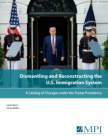Immigration Policy & Law
Recent Activity

The Colombian Response to the Venezuelan Migration Crisis: A Dialogue with Colombia’s Migration Czar
Felipe Muñoz, Advisor to the President of Colombia for the Colombian-Venezuelan Border, discusses how Colombia is coping with the influx of Venezuelan migrants, plans for future policy decisions surrounding this migration, and developments in regional and international cooperation.

This discussion marked the launch of MPI's Rethinking U.S. Immigration Policy Initiative, which aims to generate a big-picture, evidence-driven vision of the role immigration should play in America’s future, as well as to build a bipartisan center so needed reforms can be enacted.

This discussion on the 1986 Immigration Reform and Control Act (IRCA) showcases MPI Fellow Charles Kamasaki's book, Immigration Reform: The Corpse That Will Not Die. Kamasaki is joined by other veterans of the IRCA debate for a conversation on the lessons, the intended and unintended consequences, and how the law’s legacy has shaped contemporary politics on immigration.

With the U.S. administration calling for the United States to adopt a more “merit-based” immigrant selection system, this conversation focused on what policymakers should consider in designing—and managing—immigrant selection systems in a time of intense labor-market and demographic change.

At this discussion, experts from MPI and Southern Methodist University’s Texas-Mexico Center offer an overview of trends and key characteristics of highly skilled Mexican adults at the national level and for Texas, including educational levels by legal status and top industries of employment across Texas metro areas. They also discuss the policy implications of these findings.
Pages
Recent Activity
Since 2000, the German government has undertaken a series of steps to reform laws and shape public opinion in order to bring about better integration and managed migration. This can be said to constitute a new policy paradigm, the goal of which is to integrate nonnationals and promote harmonious community relations.
In this memo, a veteran immigrant-rights strategist, Frank Sharry, offers his views on the politics and policy of achieving immigration reform.
The print and broadcast media in the United Kingdom cover only a very narrow range of migration stories, primarily focusing on asylum seekers, refugees, illegal immigrants, and migrant workers. This report discusses the media's reliance on "templates" to frame migration stories, which is often set from the government's agenda on migration.
Since 1999, concern about immigration in Britain has reached levels never seen before in the history of public opinion research, and surveys show strong support for tougher immigration laws. But opinions vary: younger, better-educated people and those who tend to live in areas with a longer history of immigration are more tolerant than older, less-educated people in more settled communities with low levels of immigration.
U.S. media coverage of immigration has hindered effective policy reform for years, a trend which has been exacerbated by the recent transformation in the ways Americans get their news. This has conditioned and even distorted public perceptions by portraying a largely gradual, orderly, and legal phenomenon as chaotic, criminal, and controversial.
Recent developments in the United States (including the 2008 elections and shifts in organized labor’s stance on immigration) have created new openings for comprehensive immigration reform, possibly including a path to legal residence and citizenship for illegal immigrants. But the author argues that the extent of this opening may be overstated by some advocates.
Germany has de facto been receiving immigrants for the last four decades, but the government only began actively dealing with the long-term impact of immigration a decade ago. Since the 1990s, Germany shifted away from stemming flows to recognizing its identity as a country of immigration and managing the impact of immigration on society.
Voters’ brains connect words, phrases, images, values, and emotions, and these connections — known as networks of association — influence their receptiveness to political messages, often far more strongly than facts and rational arguments. This report shows that to reach those who have not yet made up their mind on a particular issue, advocates and leaders need to understand the associations a term such as “immigrant” spark in the mind of the electorate and strengthen positive associations while weakening negative ones.























Why the European Labor Market Integration of Displaced Ukrainians Is Defying Expectations